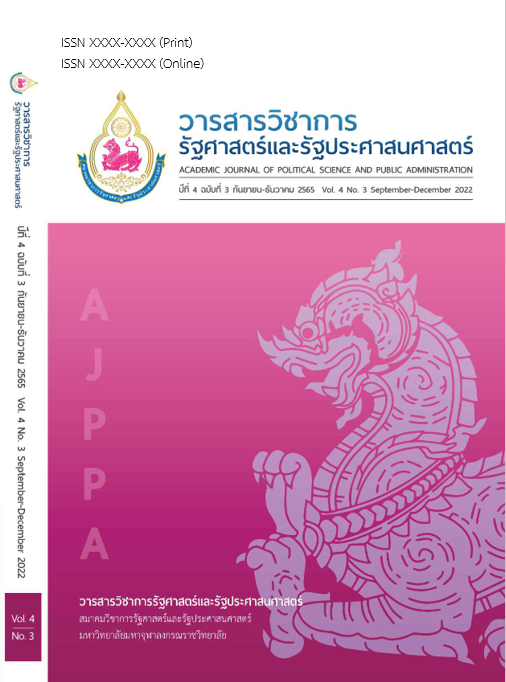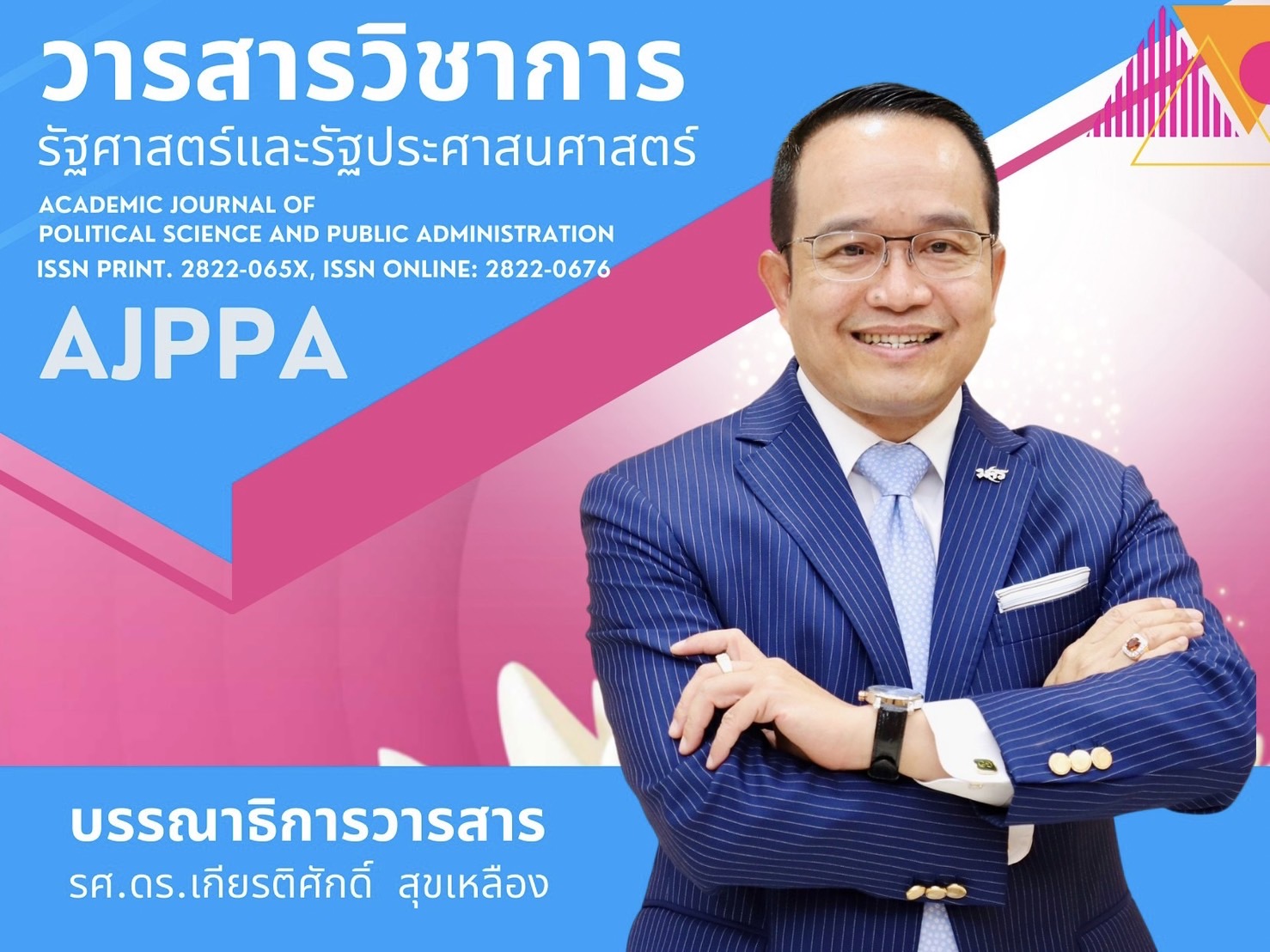สภาพทั่วไปและปัญหาอุปสรรคการตื่นตัวทางการเมืองของประชาชนในระบอบประชาธิปไตยที่มีผลต่อการเลือกตั้งทั่วไป
คำสำคัญ:
การตื่นตัวทางการเมือง, ประชาชน, ประชาธิปไตย, การเลือกตั้งบทคัดย่อ
บทความวิจัยนี้มีวัตถุประสงค์เพื่อศึกษาสภาพทั่วไปและปัญหาอุปสรรคการตื่นตัวทางการเมืองของประชาชนในระบอบประชาธิปไตยที่มีผลต่อการเลือกตั้งทั่วไป เป็นการวิจัยเชิงคุณภาพด้วยการสัมภาษณ์เชิงลึกผู้ให้ข้อมูลสำคัญ จำนวน 18 รูปหรือคน และสนทนากลุ่มเฉพาะ 12 รูปหรือคน โดยใช้แบบสัมภาษณ์และวิเคราะห์เนื้อหาเชิงพรรณนา ผลการวิจัยพบว่า 1. สภาพทั่วไปและปัญหาอุปสรรคการตื่นตัวทางการเมืองของประชาชนในระบอบประชาธิปไตยที่มีผลต่อการเลือกตั้งทั่วไป มีดังนี้ 1) สถาบันการกล่อมเกลาทางการเมือง เช่น สถาบันการศึกษา จัดกิจกรรมส่งเสริมประชาธิปไตยให้กับนักศึกษา ปลูกฝังทัศนคติ ความรู้ความเข้าใจและจัดกิจกรรมทางการเมือง กลุ่มเพื่อนเป็นกลุ่มกระตุ้นและชักชวนกันไปใช้สิทธิเลือกตั้ง 2) คุณลักษณะของผู้สมัครรับเลือกตั้ง ผู้สมัครรับเลือกตั้งเข้าไม่ถึงประชาชน เข้าถึงเฉพาะบางกลุ่ม ผู้สมัครใหม่เป็นคนรุ่นใหม่ขาดประสบการณ์ทำงาน 3) การรณรงค์หาเสียงเลือกตั้ง หาเสียงแบบใช้หัวคะแนน มีตัวแทนหรือหัวคะแนนเป็นผู้คอยช่วยหาเสียง การใช้รถโดยติดเครื่องขยายเสียงและสิ่งต่าง ๆ เช่น วิทยุ การติดป้ายตามสถานที่ต่าง ๆ 4) นโยบายของพรรคการเมือง การเสนอนโยบายของพรรคการเมืองเพื่อเป็นตัวกระตุ้นให้ประชาชนเกิดการตื่นตัวทางการเมืองซึ่งจะมีผลต่อการไปใช้สิทธิเลือกตั้ง 5) พรรคที่สังกัดของผู้สมัคร พรรคการเมืองในประเทศไทยพัฒนาคุณสมบัติของผู้สมัครรับเลือกตั้ง 6) อิทธิพลของสื่อ สื่อมวลชนเป็นหน่วยการเรียนรู้ที่มีบทบาทอย่างยิ่งต่อการรับข่าวสารทางการเมือง สื่อกระตุ้นทั้งคนรุ่นเก่าและรุ่นใหม่ให้เกิดการตื่นตัวทางการเมือง ส่วนปัญหาการตื่นตัวทางการเมืองที่สำคัญคือ ขาดการจัดฝึกอบรมให้ความรู้แก่ประชาชน ขาดความรู้ความเข้าใจทางการเมือง ปัญหาในการใช้ระบบอุปถัมภ์ใช้เครือญาติใช้พรรคพวกก่อให้เกิดกลุ่มอำนาจหรือกลุ่มผลประโยชน์ การรณรงค์หาเสียงเลือกตั้ง มีการประชาสัมพันธ์ที่ยังไม่ครอบคลุมและทั่วถึง นโยบายของพรรคการเมืองไม่สามารถทำตามนโยบายที่ให้ไว้เน้นแค่หาเสียง ขาดผู้นำพรรคที่เข้มแข็ง กล้าหาญ กล้าตัดสินใจ และมีความเป็นอันหนึ่งอันเดียวกับประชาชน สื่อออนไลน์ประชาชนเข้าถึงได้ไม่ครอบคลุมและเนื้อหาของสื่อก่อให้เกิดความรุนแรงทางการเมือง
เอกสารอ้างอิง
คงฤทธิ์ กุลวงษ์. (2561). การมีส่วนร่วมทางการเมืองของประชาชนในเขตองค์การบริหารส่วนตำบลหนองบ่อ อำเภอนาแก จังหวัดนครพนม. วารสารบัณฑิตวิทยาลัย มหาวิทยาลัยสวนดุสิต, 14(3), 113-114.
ธรรมรัตน์ ธรรมยาฤทธิ์. (2561). สภาพการตื่นตัวทางการเมืองของประชาชนในเขตเทศบาลนครอุดรธานี. วารสารการบริหารท้องถิ่น, 11(2) ฉบับที่ 2, 60-65.
นครินทร์ แก้วโชติรุ่ง. (2556). รูปแบบและหลักการของการปกครองในพระไตรปิฎก (สารนิพนธ์พุทธศาสตรดุษฎีบัณฑิต สาขาวิชาพระพุทธศาสนา). พระนครศรีอยุธยา: มหาวิทยาลัยมหาจุฬาลงกรณราชวิทยาลัย.
บ้านจอมยุทธ. (2562). การมีส่วนร่วมทางการเมืองของประชาชนในระบอบประชาธิปไตย. สืบค้น 12 ธันวาคม 2562, จาก https://www.baanjomyut.com/library_4/
constituent/07.html
พิมพ์นลิน โตไพบูลย์ และคณะ. (2560). ปัจจัยที่มีผลต่อการเลือกตั้งสมาชิกสภาผู้แทนราษฎร จังหวัดพระนครศรีอยุธยา พ.ศ. 2544-2554. การประชุมนำเสนอผลงานวิจัยระดับบัณฑิตศึกษา ครั้งที่ 12 ปีการศึกษา 2560, กรุงเทพฯ: มหาวิทยาลัยรังสิต.
วัฒนา เซ่งไพเราะ. (2555). ความตื่นตัวทางการเมืองของเยาวชนในสถานบันการศึกษาในเขตกรุงเทพมหานครกับการพัฒนาวัฒนธรรมทางการเมืองแบบประชาธิปไตย ช่วงปี พ.ศ. 2549-2554 (ดุษฎีนิพนธ์ปรัชญาดุษฎีบัณฑิต สาขาสื่อสารการเมือง).กรุงเทพฯ: มหาวิทยาลัยเกริก.
อภิญญา ฉัตรช่อฟ้า. (2564). การสร้างและพัฒนาความเป็นพลเมืองภายใต้การปกครองระบอบประชาธิปไตย. วารสารสังคมศาสตร์และมานุษยวิทยาเชิงพุทธ, 6(3), 121-122.

ดาวน์โหลด
เผยแพร่แล้ว
รูปแบบการอ้างอิง
ฉบับ
ประเภทบทความ
สัญญาอนุญาต

อนุญาตภายใต้เงื่อนไข Creative Commons Attribution-NonCommercial-NoDerivatives 4.0 International License.




